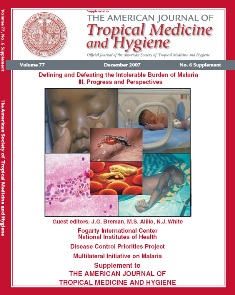Latest Malaria Research Published in Supplement Edited by Fogarty Scientist
January - February, 2008 | Volume 7, Issue 1

Articles from the supplement:
An African child dies of malaria every 30 seconds. In total, about 500 million people become severely ill with the disease each year, resulting in more than one million deaths, according to the World Health Organization (WHO).
New insights on how to best control and combat this global scourge were recently published in a supplement to The American Journal of Tropical Medicine and Hygiene, titled "Defining and Defeating the Intolerable Burden of Malaria III: Progress and Perspectives," the third in a series to be edited by Fogarty Senior Scientist, Dr. Joel Breman.
This comprehensive publication of 42 papers describes new ways of looking at classic challenges for the malaria community, as well as novel findings in clinical, epidemiologic, drug, vector, genetic and vaccine research. Special attention is given to the difficulties of diagnosing malaria and the scaling up of national and international control programs. Many of the contributing authors of the 340-page supplement hale from malarial countries, including Burkina Faso, Eritrea, India, Ghana, Kenya, Mali and Tanzania.
The challenge for the near future is integrating these advances into working, sustainable solutions--an especially daunting task given the variety of economic and scientific resources available in the approximately 90 countries where malaria is endemic.
"Malaria control will never be successful if we declare victory when rates go down and success seems at hand," wrote Fogarty Director, Dr. Roger I. Glass, in the supplement's introduction. "Sustainability will require the training of local staff to continue the scientific and administrative leadership of prevention and treatments efforts, and adequate preparation so they can monitor and address any outbreaks."
The recent call for eradication by Bill and Melinda Gates has drawn attention to the disease and the many challenges that remain. Co-author of the supplement's introduction, Dr. Anthony S. Fauci, Director of the National Institute of Allergy and Infectious Diseases (NIAID), is optimistic but cognizant of the difficulties ahead.
"The extraordinary advances highlighted in this valuable publication reflect a new commitment by the international community to confront malaria with fervor and funding," according to Dr. Fauci. "As a result of recent research, we now have new drugs that are highly effective in treating malaria, new and improved vector control strategies, and a widening pipeline of promising vaccine candidates. Even so, much remains to be done."
The supplement also includes papers that explore malaria advocacy efforts and international cooperation, examining the gains made by the Multilateral Initiative on Malaria and the Global Fund, and making recommendations for a long-term vision for global malaria prevention and control.
"Advocacy for malaria prevention, control and research requires a holistic view of the disease and an understanding of the socioeconomic and political circumstances in which malaria exists--malaria's agenda must at least coordinate, if not merge, with a broader, encompassing global health agenda," according to Dr. James Herrington, coauthor of an advocacy paper and director of Fogarty's International Relations division.
The supplement was edited by Dr. Joel Breman, from Fogarty, Dr. Martin Alilio, from the Academy for Educational Development (formerly of Fogarty), and Dr. Nicholas J. White, a distinguished professor of tropical medicine at Mahidol University in Bangkok, Thailand and Oxford University in England.
Multiple donors funded the publication, including Fogarty, NIAID, the CDC, and the Foundation for the National Institutes of Health with unrestricted contributions from the Bill & Melinda Gates Foundation, the Burroughs Wellcome Fund, GlaxoSmithKline, and the World Health Organization.
Full text of the supplement can be accessed by visiting:
http://www.ajtmh.org/content/vol77/6_Suppl
Printed copies or CD-ROMs of the supplement are also available by contacting Cherice Holloway at hollowac@mail.nih.gov or (301) 496-0815.
To view Adobe PDF files,
download current, free accessible plug-ins from Adobe's website.